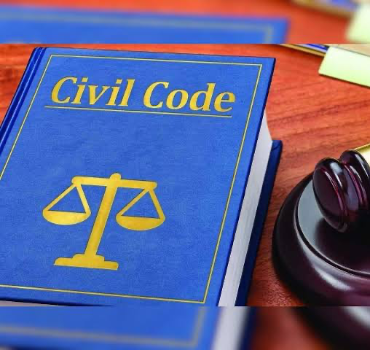Uniform civil code in India



The Uniform Civil Code (Hindi: समान नागरिक संहिता, romanized: Samāna Nāgarika Saṃhitā) is a proposal in India to formulate and implement personal laws of citizens which apply on all citizens equally regardless of their religion, gender and sexual orientation. Currently, personal laws of various communities are governed by their religious scriptures.[1] Implementation of a uniform civil code across the nation is one of the contentious promises pursued by India's ruling Bharatiya Janata Party. Personal laws are distinguished from public law and cover marriage, divorce, inheritance, adoption and maintenance. While article 25-28 of the Indian constitution guarantees religious freedom to Indian citizens and allows religious groups to maintain their own affairs, article 44 of the constitution expects the Indian state to apply directive principles and common law for all Indian citizens while formulating national policies.[2][3]
Personal laws were first framed during the British Raj, mainly for Hindu and Muslim citizens. The British feared opposition from community leaders and refrained from further interfering within this domestic sphere. Indian state of Goa was separated from India due to colonial rule in the erstwhile Portuguese Goa and Damaon, retained a common family law known as the Goa civil code and thus being only state in India with a uniform civil code till date. However, the Goa civil code is not uniform as it has special provisions for different communities, for example, it allows bigamy to Hindu men if the wife does not deliver a child before the age of 25 or a male child before the age of 30. Following India's independence, Hindu code bills were introduced which largely codified and reformed personal laws in various sects among Indian religions like Buddhists, Hindus, Jains and Sikhs but it exempted Christians, Jews, Muslims and Parsis, being identified as distinct communities from Hindus.[4][5]
UCC[6] emerged as a crucial topic of interest in Indian politics following the Shah Bano case in 1985. The debate arose when the question of making certain laws applicable to all citizens without abridging the fundamental right of right to practice religious functions. The debate then focused on the Muslim Personal Law, which is partially based on the Sharia law, permitting unilateral divorce, polygamy and putting it among the legally applying the Sharia law. UCC was proposed twice, in November 2019 and March 2020 but was withdrawn soon both of the times without introduction in parliament. The bill is reported to be being contemplated due to differences between BJP and RSS.[7] Many opposition parties and BJP's allies from the NDA have opposed the Uniform Civil Code, especially from Northeast India, claiming it will go against the "idea of India" and will end special privileges of tribal communities after renewed calls by Prime Minister Narendra Modi in June 2023 about implementing a UCC.[8][9][10]
Create one here!
-
Government of India
Recent Votes
|
|
voted Sep 14 2023
|